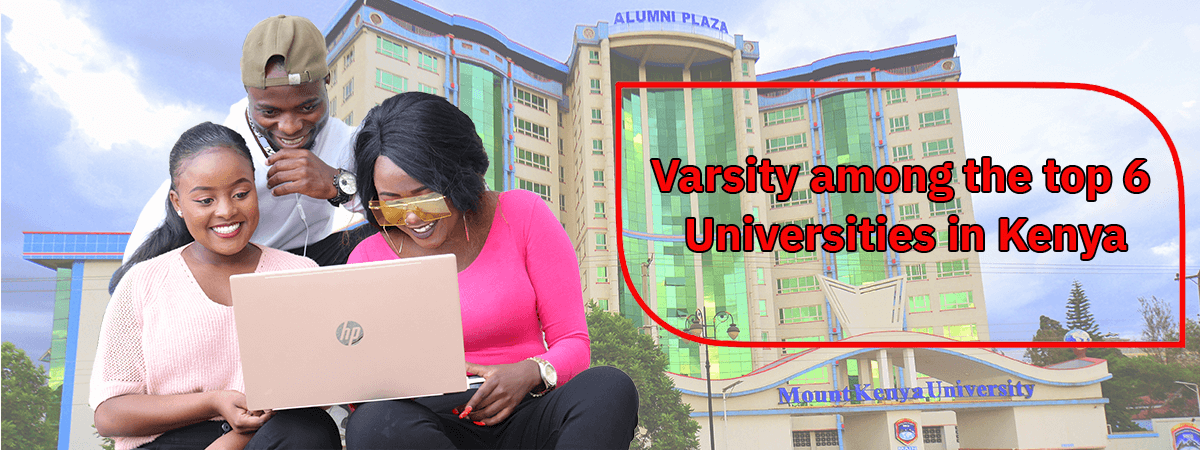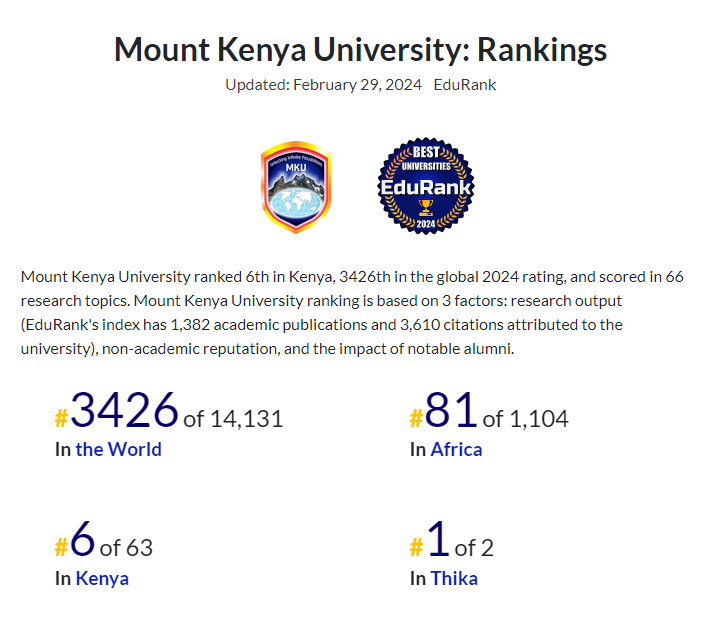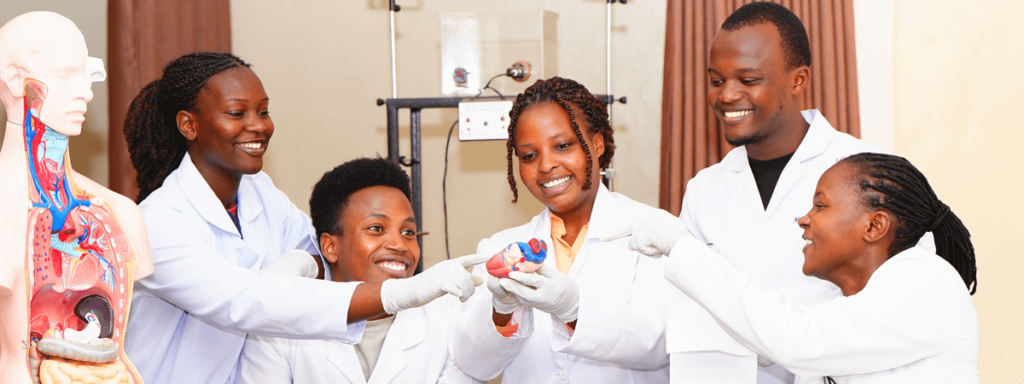
MKU among the top Universities in latest ranking
Mount Kenya University (MKU) is among the top six universities in the country. This is according to the latest survey by EduRank that listed the top 100 universities in Africa based on research outputs, non-academic prominence, and alumni influence.
The ranking comes as more MKU faculty members submit strong proposals and attract research funding. In the ranking, only one private university is ahead of MKU.
In the first two months of this year alone, MKU faculty members have won seven research grants. Other proposals by MKU academic staff are in line for funding between this year and 2029, as the university ramps up its research and innovation outputs.
MKU’s College of Graduate Studies principal, Dr Henry Yatich, says research at the university is off to an inspiring start. Citing new developments, the don asserts that this year the university “is solidifying its role as a beacon of research and innovation.”

As part of compliance with the Commission for University Education’s (CUE’s) requirement that universities should support research initiatives, MKU has increased funding for the Vice- Chancellor’s Research and Innovation Grant, from Sh20 million previously, to Sh30 million this year.
This aligns with the university’s mission to foster impactful research that addresses societal needs and promotes sustainable development.
Dr Yatich says: “At MKU, the ethos of community engagement and collaboration underpins our research endeavors, as we strive to forge partnerships that catalyse positive change and enrich societies this year, and beyond.”
The don has selected a few of this year’s notable external grants to highlight the cause of the research buzz at MKU.
ICIPE is funding research at Kenya’s coast on seaweed innovations for sustainable products. The focus is on food sustainability and health promotion.
MKU has also secured the Student Training in Entrepreneurship Promotion (STEP) grant.
STEP is a collaborative effort involving Germany’s Leuphana University, South Africa’s University of Venda, Nigeria’s Godfrey Okoye University, and Kenya’s MKU.

Under this grant, MKU will focus on fostering sustainable entrepreneurial ventures within the country.
Also, MKU, jointly with Leipzig University of Germany, received funding under the EXIST Business Start-up Grant. The grant will support a team of innovators to advance commercialisation of the university’s product prototypes such as the WEMA Black Soap and EcoTrace innovation. The first product addresses the demand for natural black herbal soaps. The latter innovation promotes refill systems for small households, thereby driving environmental conservation. The grant brings together consortium members under African Centre for Career Enhancement and Skill Support (ACCESS) funded under Erasmus+ Mobility.
The WEMA Black soap is envisaged to compete well in the blue ocean market.
Dr Yatich explains the reason for the optimism: “Demand for natural black herbal soaps is growing among the young and the upper class citizens.”
He cites research by ResearchAndMarkets.com, which shows that whereas black soap’s market share in Kenya is less than 10 percent, it is projected to grow to 20 percent by 2025.
MKU has embarked on collaborative research endeavors with the University of Manchester and Kenyatta University Teaching and Referral Hospital (KUTRRH) to establish a modern biostatistics lab, focusing on cancer-related diseases.
Partnerships with institutions like the MAYO Clinic and grants from organisations such as England’s NIH further underscore MKU’s commitment to advancing healthcare research.
Dr Yatich reports that the university also won a grant from NIH on Implementation Research on HPV DNA testing in Kenya.
Such research programmes have won the university, together with Kenyatta University and Makerere University Business School (MUBS) recognition from CleanEnergy-Germany. The German organization will sponsor three students and one faculty member from each university to attend an innovation boot camp in April 2024 in Nairobi.
The university will later this year showcase student innovations in South Africa and Germany. Currently, MKU’s innovation hub has 15 incubates from the 2023 Research Innovation and Digital Agri Expo (RIDAE_2023). The university is hosting the innovators for mentorship and possible commercialisation of their innovations.
In February, MKU sent staff and local partner university representatives (TUK and Machakos University) to Rwanda Summer School 2024, through its ACCESS project. The officials went to explore employability strategies for graduate students in Africa. Additionally, the university researchers are expanding its network of collaborators with invitation from DAAD to ADDIS in February 2024. Others received an invitation by City of Hope Comprehensive Cancer Centre in the USA.
Through a partnership with Partners for Care (PFC) and the Lumumba Foundation, the university is supporting the distribution of WaterSafe backpacks to all basic learning institutions’ classrooms from 2024-2026.
DAAD has also supported MKU to spearhead a conversation on development leveraging on the SDGs 10, 11, 17 and Agenda 2063 through Applied Research and Teaching for Sustainable Development in Africa (ART4DEV). This is a joint programme with Moi University, University of Cape Coast Ghana (UCC), Mount Kenya University (MKU) and the Institute of Finance Management, Tanzania (IFM). Through the programme, these institutions seek to contribute to sustainable economic development and enhance educational quality.
Dr Yatich says the university’s dedication to inclusivity is evident through partnerships with organisations such as the Initiative Return for the Development of Sub-Saharan Africa (IRDAS). This initiative seeks to promote Science, Technology, Engineering, Arts and Mathematics (STEAM) programmes across Kenya, Ethiopia, and Nigeria. There are plans to expand the initiative into other sub-Saharan nations. The project is funded by the Basque Government and brings on board high schools in Nigeria and Kenya, Mount Kenya University and Olabisi Onabanjo University to promote STEAM uptake among women and girls.
Dr. Yatich explains that the enhanced Vice-Chncellor’s Grant will promote staff capacity in research and publishing. This is in line with the Vice-Chancellor’s desire to have the university enhance its research component and promote impact-based research that will enhance socio-economic sustainability and providing solutions to communities and economies.
MKU has also secured a World Bank grant in support of a programme aimed at strengthening Kenya’s innovation ecosystem, facilitating international recognition and opportunities for student innovators.
Additionally, through the Berkeley Initiative for Transparency in the Social Sciences (BITSS) grant is purposed to promote ethical based research practice and outputs.
Dr Yatich reveals that MKU has recently launched a Master of Ethics Programme, to support the research component for the students. This programme will be supported by funding from KEMRI.












